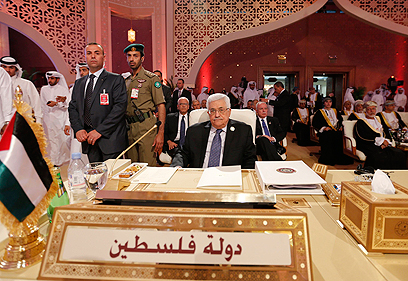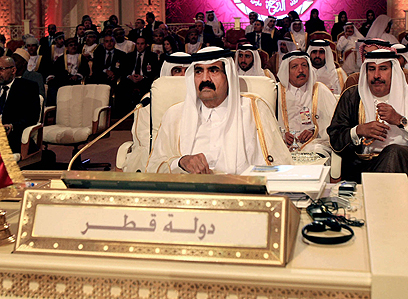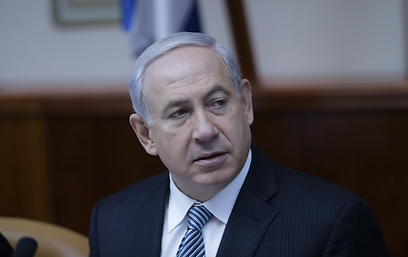
In Washington Monday, Qatari Prime Minister Sheik Hamad Bin Jassem Al Thani tried to allay some of the Israeli concerns. Speaking on behalf of an Arab League delegation, he reiterated the need to base an agreement between Israel and a future Palestine on the 1967 lines, but for the first time, he cited the possibility of "comparable," mutually agreed and "minor" land swaps between the Israelis and the Palestinians.
Related stories:
- Arabs soften stance on Israel's final borders
- Livni on Arab initiative: They realized border must change
- Lapid-Bennett initiative: Referendum on any peace deal
Sheik Hamad spoke after talks with Vice President Joe Biden and US Secretary of State John Kerry, who has been pushing Arab leaders to embrace a modified version of the Arab peace plan as part of a new US-led effort to corral Israel and the Palestinians back into direct peace talks. The changes are meant to win Israeli support by allowing it to keep parts of the West Bank and east Jerusalem as part of an agreement.

Abbas at Arab League summit in Doha. Archive (Photo: Reuters)
In Washington, Kerry called the changed language a "very big step forward."
"This is literally a statement by the Arab world that they're prepared to make peace, providing the Palestinians and Israelis reach a final status agreement," he told reporters Tuesday at the State Department after meeting Spain's foreign minister.
"I don't underestimate the significance of Saudi Arabia, Qatar, Arab Emirates, the Egyptians, the Jordanians and others coming to the table and saying, `We are prepared to make peace now in 2013,'" he said. Still, he said much more was left to do.
"We have a lot of homework to do, a lot of tough hurdles to get over, but each step forward is the way you get there," Kerry said.

Qatari PM Sheik Hamad Bin Jassem Al Thani. Archve (Photo: AP)
The gesture immediately put Netanyahu in a difficult position. A cool reception to the Arab League could reinforce the international perception that Netanyahu is not serious about pursuing peace.
But forces in Israel could doom the plan before it ever gets off the ground. Netanyahu himself has repeatedly said the 1967 frontiers would put Israel's security in danger and said he is not bound by any concessions made by his predecessors. In addition, the hard-liners who dominate his coalition would resist the concessions required by the Arab plan.
Netanyahu's office declined requests for comment Tuesday. But Cabinet minister Silvan Shalom, a senior Likud member, played down the Arab League's decision, saying, "there is nothing new here."
"In principle, I support renewing the process. Of course, I don't accept the 1967 lines," he told Israel Radio. "If the Arab League wants to be a partner to this process, then we welcome it, but this is not negotiations."
At the same time, the more dovish members of his coalition are likely to press Netanyahu to embrace the latest Arab approach.
Dovish partners
Livni, while acknowledging that Israel had concerns about some of the details of the Arab initiative, said Israel must nonetheless respond positively. "It's good news that should be welcomed," she said in a Facebook post.
She noted that the plan gave the Palestinians important backing from the broader Arab world to make small concessions on the border issue, while it sent an important message to Israel that peace with the Palestinians means peace with the entire Arab world. "I hope that the message that comes from Qatar will help launch the negotiations as soon as possible."
Yesh Atid chairman Yair Lapid has said he would demand the government conduct a "serious" peace process with the Palestinians. He has also endorsed the concept of land swaps so that Israel can keep certain Jewish settlements in the West Bank.
Dov Lipman, a Yesh Atid lawmaker, said the party had not yet formulated a formal response to the Arab initiative, but said it was "very consistent" with the party's platform. "We need to be negotiating. It's the only way to solve the conflict," he said.
And President Shimon Peres, a Nobel peace laureate, said the Arabs' decision provided a new chance to restart peace talks.
"The ministers of the Arab League once again expressed their support for the two state solution, which is also accepted by us and a broad structure of support is being created for making progress," he said during a meeting with Pope Francis at the Vatican.
Members of the opposition Labor Party urged Netanyahu to accept the Arab initiative.
Opposition Chairwoman MK Shelly Yachimovich, the Labor party chairwomen, demanded that Prime Minister Benjamin Netanyahu officially and positively respond to the Arab League's announcement. "This is an important step taken by the Arab world, and there is a chance it will be ground breaking," Yachimovich said
"I think the Israeli government should embrace it with both hands," said Erel Margalit, a Labor lawmaker. "This is the breakthrough we have been looking for."
Margalit said he was in the process of forming a parliamentary lobby to support the initiative, and said Labor would support Netanyahu from the opposition if he embraced the plan.
While the Palestinians voiced objections to modifying the Arab League plan, their chief negotiator, Saeb Erekat, said Tuesday that the Palestinians supported the new proposal.
"Israeli rejection of this initiative shows once again that the Israeli government lacks of a peace plan," he said in a statement. "Rather, it is fully engaged in further colonization and attacks against Palestinian rights and regional stability."
- Receive Ynetnews updates
directly to your desktop
















